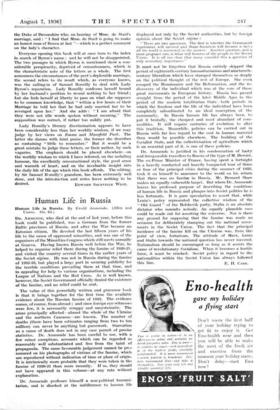Human Life in Russia Da. Am/KENDE, who died at the
end of last year, before this book could be published, was a German from the former Baltic provinces of Russia, and after the War became an Estonian citizen. He devoted the last fifteen years of his life to the cause of oppressed minorities, and was one of the organisers of the Minorities Congress which still meets annually at Geneva. Having known Russia well before the War, he helped to organise relief there during the famine of 1920-21, and visited the country several times in the earlier years of the Soviet regime. He was not in Russia during the famine of 1932-33, but played' a large part in securing publicity for the terrible conditions prevailing there at that time, and in appealing for help to various organisations, including the League of Nations and the Red Cross. As is well known, however, the Soviet Government officially denied the existence of the famine, add no relief could be sent.
The value of this powerfully written and gruesome book is that it brings together for the first time the available evidence about the Russian famine of 1933. The evidence comes, of course, from abroad ; and since foreign eye-witnesses were few, it is necessarily scrappy and unsystematic. The areas principally affected—almost the whole of the Ukraine and the northern Caucasus—are known. The number of deaths (there have been estimates ranging' from two to ten million) can never be anything but guesswork. Starvation as a cause of death does not in any case permit of precise statistics. Dr. Ammende has been careful to use, with a few minor exceptions, accounts which can be regarded as reasonably well substantiated• and free from the taint of propaganda. The same favourable judgement cannot be pro- nounced on his photographs of victims of the famine, which are reproduced without indication of time or place of origin. It is intrinsically more probable that they were taken in the famine of 1920-21 than more recently. If so, they should not have appeared in this volume—at any rate without explanation.
• Dr. Ammende professes himself a- non-political- humani- tarian, and is shocked at the indifference to human life
displayed not *only by the Soviet authorities, but by foreign opinion about the Soviet regime :
"There are two questions. The first is whether the Communist experiment will succeed and State Socialism will become a fact ; all the world is interested in the answer. Another question, and a most pregnant one, is what will become of the people in the Soviet Union. It is all too clear that many consider this a question of only secondary importance."
It must not be forgotten that Russia entirely skipped the period of eighteenth-century humanitarianism and nineteenth- century liberalism which have stamped themselves so deeply on the political thought of the rest of Europe. She even escaped the Renaissance and the Reformation, and the re..- discovery of the individual which was at the core of those great movements in European history. Russia has passed straight from the period of the later Middle Ages to the period of the modern totalitarian State—both periods in which the freedom and the life of the individual have been completely subordinated to an ideal conception of the community. In Russia human life has always been, to put it brutally, the cheapest and most abundant of com- modities. It will require centuries of evolution to alter this tradition. Meanwhile, policies can be carried' out in Russia with far less regard to the cost in human material than would be possible elsewhere. The building of the Socialist State, and the collectivisation of agriculture which is an essential part of it, is one of these policies.
Dr. Ammende is justified in his condemnation of hasty and irresponsible travellers to Russia of the type of M. Herriot. The ex-Prime Minister of France, having spent a fortnight in a heavily conducted and heavily banqueted tour of three or four of the principal cities during the summer of 1933, took it on himself to announce to the world on his return that there was no famine in Russia. Mr. Bernard Shaw makes an equally vulnerable target. But where Dr. Ammende leaves his professed purpose of describing the conditions of human life in Russia and plunges into Soviet politics he is less fortunate. It is pure speculation to assert that, while Lenin's policy represented the collective wisdom of the " Old Guard " of the Bolshevik party, Stalin is an absolute dictator who consults nobody. An equally plausible case could be made out for asserting the converse. Nor is there any ground for supposing that the famine was made an occasion for deliberately stamping out the national move- ments in the Soviet Union. The fact that the principal incidence of the famine fell on the Ukraine was, from this point of view, fortuitous. The attitude of Marx, Lenin and Stalin towards the national question has never wavered. Nationalism should be encouraged so long as it assists the cause of revolutionary Socialism. When it becomes a hostile force, it must be crushed. Soviet policy in regard to the nationalities within the Soviet Union has always followed






































 Previous page
Previous page